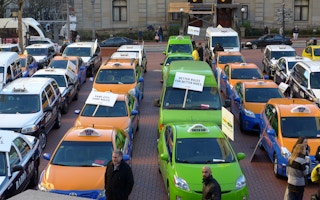The sharing economy could be called the accidental revolution.
When Brian Chesky and Joe Gebbia started renting out a spare air-bed in their apartment to make ends meet in early 2007, little did they know that they would go on to create Airbnb, the example par excellence of the new ‘alternative economy’.
The sharing economy is now one of biggest and fastest-growing economic trends in modern years. In 2013, Forbes estimated rates of growth in this new peer-to-peer economy to be in excess of 25 per cent per year.
Developed and fed through interactions between consumers, the sharing economy can be best described as an economic system grounded in the sharing of resources. In the sharing economy, idle resources—a spare bed, an unused car, or even an unused power tool left in the garage—are reallocated to those who need them. Waste is reinvested and resources are maximised to their full potential. Things that would otherwise be wasted are shared, and the economy becomes a lot more circular.
It is no surprise therefore that the sharing economy has been often lauded as a key to a sustainable future.
However, when we shift our notion of sustainability beyond a limited resource-utilisation definition to one that encompasses all areas of the environmental, social and governance (ESG) spectrum, the yellow brick road of the sharing economy loses some of its lustre.
“
In the simplest terms, the sharing economy is only as interested in sustainability as its consumers are. Often—and especially in terms of wider social and governance issues—this is not at all.
True sustainability encompasses far more than the efficient use of resources, and needs to incorporate important considerations of social and economic issues. When we take into account elements such as human/worker rights or the need to meet regulatory requirements, how does the sharing economy hold up as a model of sustainability? It turns out that the sharing economy holds as many problems as potential.
Where are the issues?
The example of Uber—perhaps one of the most successful sharing economy ventures— is particularly illuminating. The role Uber plays in moving towards a more resource-friendly future is clear and inherent to their business strategy. The company has made a major marketing point out of the claim that it has contributed to taking over 1 million cars off the road in New York City in 2015 as people lose the need for private vehicles.
Yet the company has been plagued by scandals that seriously call into question its relationship with the other important aspects of sustainability. Uber has been highly criticised for its treatment of employee drivers after numerous protests were staged when drivers were dismissed with no warning due to low reviews or budget cuts.
The drivers are not ‘bona fide employees’, says Uber, and thus do not need to be given the same rights and working conditions as regular office employees.
Accusations of anti-competitiveness have also been recurrent, with Germany and other countries banning Uber due to the unfair competition they pose to the local taxi industry. Institutions such as the Pennsylvania Public Utility Commission have raised other issues such as the lack of safety measures and regulations that are applied to Uber rides.
These problems are not unique to Uber and occur across the wide spectrum of sharing economy companies. TaskRabbit’s restriction on inter-employee communication has raised concerns over the denial of collective action among workers. In New York; the leftover sharing business Mealku has been subject to complaints by restaurants about the inherent lack of health or safety standards; and Airbnb has been embroiled in a legal battle over their refusal to pay taxes levied on hotels.
This cursory list is only the tip of an iceberg of difficulties faced by the infant sharing economy in terms of their environmental, social and governance issues.
These issues are a telling symptom of the inherent problems the sharing economy faces in managing the issues most intrinsic and vital to creating a truly sustainable economy.
What’s going wrong?
It’s clear that sustainability issues are getting left behind as this new economy thrives. While the notion of sustainable business is a component of the sharing economy, it is clearly not its defining factor.
Researchers have pointed out that sustainability is only a concern and motivation for a portion of those in the sharing economy, emphasising that most participants are choosing to participate due to its financial and social benefits, i.e. access to extra cash and new opportunities to meet people.
It is also worth recognising that in this new peer-to-peer model, the sharing economy is a system where the consumers are often the decision makers; they make up the vendors, employers and the employees in this new set-up.
In the simplest terms, the sharing economy is only as interested in sustainability as its consumers are. Often—and especially in terms of wider social and governance issues—this is not at all.
Without a structural or regulatory system that has advanced itself to ensure that basic environmental, social and governance requirements are met, it is easy for companies in the sharing economy to remain out of the spotlight. Without these considerations being addressed, the sharing economy ends up looking a lot more like an obstacle than a key to a sustainable future.
It is clear that in this new ecosystem upending aged business models, a guiding hand needs to come in to shape its direction for the better. It is up to sustainability experts and governments as much as the companies themselves to step up to this new challenge and find ways to make sustainability in its widest sense applicable to the new models and modes of consumption which often leave these considerations as an afterthought.
As systems evolve, so does the need to remain aware of their limitations and move to correct them where necessary. If we can do this, the future is bright and perhaps the sharing economy can provide an easier road to a sustainable future.
Nicolas Heath is an intern at Paia Consulting. This post is republished from Paia Consulting’s website with permission.











